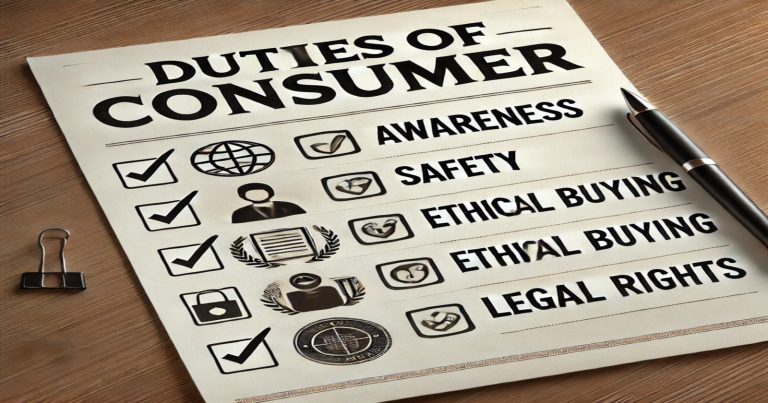The duties of a consumer refer to the roles that every buyer should follow while purchasing goods or services. A consumer should be prudent, make wise decisions, and ensure that their purchases are safe and of quality. Consumers’ duties include checking details about the products, demanding bills, consuming ethically, and airing complaints whenever necessary. These ensure safe consumers, eliminate fraud, and foster fair trade. Being accountable as consumers can help them protect their rights and, thereby, improve the environment of the market.
Who is a Consumer?
A consumer is someone who purchases goods or obtains services for his use and not for resale or business purposes. According to the Consumer Protection Act 2019, a consumer is an individual who pays for goods or services for personal needs.
Duties of Consumer
Consumer’s duties include maintaining ethical business practices and protecting buyers from fraud. Every consumer must follow these responsibilities to ensure fair trade and product safety.
Duty to Be Aware
Consumers must gather complete information before purchasing any good or service. They should check prices, ensure quality, and read reviews from customers. It is essential to check whether the product meets safety standards and complies with legal requirements. It is a matter of awareness that helps make better choices and avoid fraud or poor-quality items.
Duty to Check Quality and Safety
Consumers should always purchase products that meet safety and quality standards. The reliability can be ensured through certification marks such as ISI, BIS, AGMARK, or FSSAI. This avoids hazardous or substandard products that may prove hazardous to health and money. It helps the customers make safe and wise purchases.
Duty to Demand a Bill or Receipt
Consumers should always demand a bill, invoice, or proof of purchase. A bill is required to claim warranties, refunds, or file legal complaints. It also prevents black-market transactions. Maintaining records of purchases ensures financial security and legal protection in case of disputes.
Duty to Follow Instructions and Use Products Properly
Consumers should always read and stick to the maker’s guidelines. Improper use can damage the product, thus rendering the warranty useless. Anything that is stored and used according to guidelines will last longer and be safer to use. Instructions also help avoid unnecessary risks or accidents.
Duty to Report Faulty Products or Services
Consumers should report defective products or unfair trade practices immediately. A complaint can be filed in a consumer forum or before the regulatory authority. Online reviews help caution other buyers. Reporting problems ensures better services and discourages unethical business practices.
Duty to Avoid Wastage and Buy Ethically
Consumers should only purchase what they need and avoid overconsumption. Eco-friendly habits, such as using reusable bags and minimizing plastic waste, contribute to the betterment of the environment. Purchasing local and sustainable products helps society and nature. Ethical buying encourages responsible consumption.
Duty to Be Aware of Consumer Protection Laws
Consumers need to know about the Consumer Protection Act regarding their rights and duties. The knowledge of refund policies, return options, and service guarantees will help consumers make the right decision. Understanding legal rights helps consumers seek justice in cases of fraud or defective products.
Duty to Maintain Ethical Consumer Behavior
Consumers should not purchase counterfeit or illegal products. Fairtrade and not filing frivolous complaints promote ethical shopping. Paying taxes and following legal procedures supports the economy and promotes fair business. Ethical behaviour helps in creating a trustworthy market for all people.
Effects of Irresponsible Consumer Behavior
Irresponsible consumerism works harmful to consumers and society at large. Buying low-quality or counterfeit products may cost individuals money and lead to health hazards. Non-compliance to standards of safety may result in accidents and injuries. Consumers who do not gather information about the product may fall prey to scams or misleading advertisements.
Wasting resources and overconsumption damage the environment. Plastic waste, food waste, and unnecessary shopping increase pollution and climate change. The consumers who don’t recycle and use eco-friendly products increase the landfill waste. Responsible consumption will reduce environmental damage and make future generations sustainable.
Unfair consumer behaviours impact the business and economy. Pirated buying of goods is unfair competition to the genuine ones. Failure to pay taxes not only hurts the government funds but also retrenches services that might have been provided. False complaints and frauds lead to mistrust between consumers and sellers, hence making the market less efficient and reliable.
Consumer Protection Act
The Consumer Protection Act 2019 safeguards consumers against fraud, unfair trade practices, and low-quality products. Consumers are accorded fair treatment and legal aid in case of rights infringement.
- Consumer Protection Rights: They offer legal protection against misleading advertising and defective goods.
- Consumer Dispute Redressal Forums: Introduces district, state, and national consumer dispute redressal commissions to resolve grievances.
- Product Liability Law: Holds the manufacturers, sellers, and service providers liable for products which prove to be defective.
- E-Commerce Consumer Protection: Consumer protection laws include e-commerce consumer protection and the frauds involved in online shopping.
- Strict Penalties for False Advertising: Advertisers making false claims can be fined heavily and even face lawsuits.
Duties of Consumer FAQs
1. What are the fundamental duties of consumer?
Duties of consumer: Consumer will be Informed, check product quality, Demand bill, usage instructions, Report frauds, Consumer protection laws
2. What is the Consumer Protection Act?
Consumer Protection Act, 2019 is a legal provision for the protection of consumers from unfair trade practices, fraud, and defective products by providing support for legal complaints.
3. How can a consumer file a complaint under the Consumer Protection Act?
A consumer can file his grievance over the internet from https://consumerhelpline.gov.in/ or even approach consumer courts at the district, state, or even national level.
4. Why is it crucial to embrace consumer responsibilities?
The adoption of consumer responsibilities can deter fraud, protect the safety of products, and promote fair prices and ethical trade practices in the marketplace.
5. What are consumer’s rights in the Consumer Protection Act?
The Consumer Protection Act 2019 protects the rights of consumers to safety, information, choice, being heard, redressal, and consumer education.


